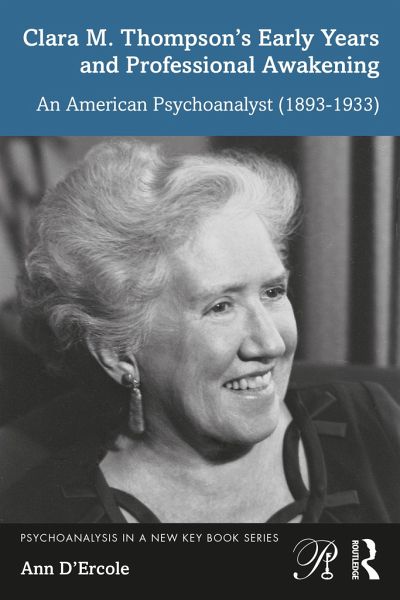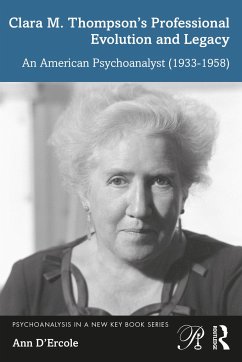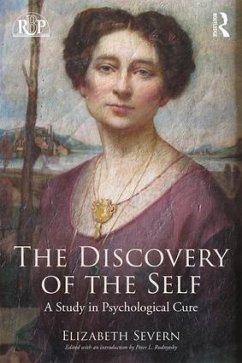'In my candidacy at the White institute in the early fifties, I was interviewed by Dr. Thompson, took her courses, was in supervision with her and later came to know her during summers on the Cape. I am delighted to see this thoughtful and respectful book by Dr. D'Ercole. It is a labor of love by a prominent feminist psychoanalyst in tribute to a much-overlooked major contributor to psychoanalytic theory and practice. That is, of course, consistent with the treatment of women in most scientific venues at the time, but also "Clara's" (we all called her that, but not always to her face) modesty led her to act as a portal to the work of Sullivan and Fromm - the two other founders of WAW. Dr. D'Ercole has done an outstanding job of explicating
Dr. Thompson's prescient contributions to modern psychoanalytic theory and practice but has also grasped her in her most human aspects. For all my long association with Dr. Thompson, and in spite of her friendliness and egalitarianism, I hardly knew her. I trust this outstanding book will remedy this oversight and revitalize a much-deserved interest in this most interesting and complex person.'
Edgar Levenson is a fellow emeritus, faculty, training and supervisory analyst at the William Alanson White Institute; he is adjunct clinical professor of Psychology at New York University, and author of Fallacy of Understanding
; The Ambiguity of Change
; The Purloined Self
; and Interpersonal Psychoanalysis and the Enigma of Consciousness
'Clara Thompson was not only one of the most important leaders in the psychoanalysis of her time, but also one of the singular figures in the entire history of the discipline. She was a pioneer in so many ways, founding and then directing one of the most significant psychoanalytic institutes, bringing together the work of Erich Fromm and Harry Stack Sullivan to create interpersonal psychoanalysis, and creating one of the first bodies of work devoted to the psychology of women. She was one of those who created the study of gender and sexuality. She was a powerfully inspiring leader at a time when that was highly unusual for a woman in psychiatry or psychoanalysis. Thompson richly deserves Ann D'Ercole's deep, thorough, and moving account of her life. This two-volume work is absolutely riveting, an instant classic that will be read and studied not only by psychoanalysts and other psychotherapists, but by anyone interested in cultural history, feminism, the history of psychiatry, and gender and sexuality.'
Donnel B. Stern
most recently authored The Infinity of the Unsaid: Unformulated Experience, Language, and the Nonverbal
'Ann D'Ercole's two-volume biography carefully documents and reveals Clara Thompson's often-overlooked role and contributions to the development of interpersonal psychoanalysis in the United States. "Clara," as interpersonalists still refer to her today, was analyzed by Sandor Ferenczi in Budapest and worked closely with Harry Stack Sullivan, Erich Fromm and Frieda Fromm-Reichman. She was the first Director of the William Alanson White Institute in New York City (currently housed in the Clara Thompson building) and the training and supervising analyst for many pioneers of contemporary interpersonal and relational theory. D'Ercole has done an exemplary and engaging job of correcting this historical omission of Thompson's foundational role as "An American Psychoanalyst".'
Jack Drescher
is a training and supervising analyst at the William A. White Institute; adjunct professor of the Postdoctoral Program in Psychotherapy and Psychoanalysis; a clinical professor of Psychiatry at Columbia University; and senior psychoanalytic consultant at the Columbia Center for Psychoanalytic Training and Research'Ann D'Ercole has accomplished a special scholarly work about Clara Thompson, M.D. Has Thompson having been a foremost student of Sandor Ferenczi placed her in the analytic shadows? Ann's thorough, lively and insightful writing brings Thompson out of the shadows and into the limelight where she belongs. Ann's outstanding research has clarified Thompson's brilliant contributions to psychoanalysis: a prominent figure in establishing the American School of Psychoanalysis; a leading contributor in the formation of the Interpersonal School of Psychoanalysis; a leading student and advocate of the work of Sandor Ferenczi and Henry Stack Sullivan; a founder of the William Alanson White Institute; a leading feminist of her time; a pioneering theorist and clinician in establishing the two person perspective in psychoanalysis. Ann's biography of Thompson should become the premium resource that rediscovers the importance of Clara Thompson for psychoanalysis.'
Arnold Wm. Rachman is a training and supervisory analyst at the Postgraduate Psychoanalytic Institute, NYC; clinical professor of Psychology at Adelphi University's Postdoctoral Program in Psychoanalysis and Psychotherapy, Garden City, NY; associate professor of Psychiatry at New York University Medical Center, NYC; donor of the Elizabeth Severn Papers, The Library of Congress; and recently authored Psychoanalysis and Society's Neglect of the Sexual Abuse of the Children, Youth and Adults
(Routledge).'In this engaging paean to the life of Clara Thompson, D'Ercole excavates, brings to life, and carries forth the historical record in adroitly making the case that Thompson deserves placement in the upper echelons of the pantheon of psychoanalysts. She plumbs the depths of her own personal connection to Thompson in illuminating the essential contributions of Thompson to the field of interpersonal psychoanalysis. A hidden gem, not just for readers unfamiliar with Thompson's work, this is a must read for all.'
Jean Petrucelli is faculty, training, and supervising analyst at the William Alanson White Institute; adjunct professor and clinical consultant of the NYU Postdoctoral Program in Psychotherapy & Psychoanalysis; and most recently, co-editor of the book, Patriarchy and Its Discontents
















